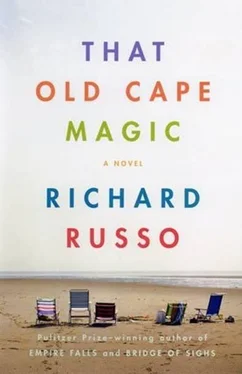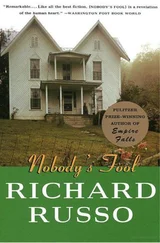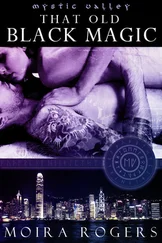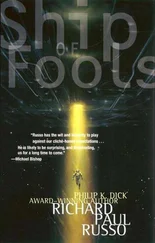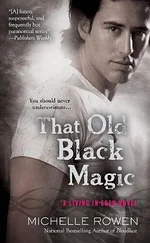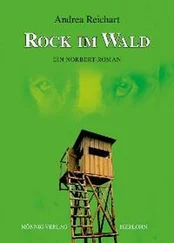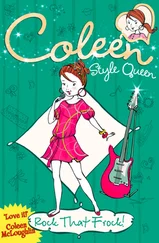“We could’ve gone to the Blue Martini anyway,” his mother said.
“Yeah, but what would be the point?”
Two weeks earlier Griffin wouldn’t have understood the question, but now he did. Indeed, what was the point of anything? He’d never asked himself such a question before. After dinner, as darkness fell, they took a long drive with no particular destination in mind, as they sometimes did their last night on the Cape, breathing it all in, filling their lungs with the salt air, as if they could carry it back with them to breathe in the Mid-fucking-west. No one spoke. By the time they returned to the cottages it was pitch-dark except for the dancing sparklers in front of the Brownings’ cottage. Griffin paused when he climbed out of the car, waiting for Peter’s disembodied voice to call him over, so he once more could say no and derive that same perverse satisfaction, but no invitation came.
Upstairs-in his tiny bedroom under the eaves-he undressed in the dark and crawled into bed. From his window he saw five distinct sparkler tracks writing their ghostly script, but how could that be, with only four Brownings? Was one of them waving two sparklers at once? In the last twenty-four hours several other cottages had become occupied. Had the Brownings already found someone to replace him? Feeling his throat constrict at this cruel possibility, he pulled the shade down. But even with his eyes clamped tightly shut, he could still see the Brownings’ joyous sparklers etching their collective happiness on the night.
It had been the stuff of good fiction, Griffin knew, but he’d somehow managed to mess it up in the telling, and when the writers’ strike ended sooner than expected he’d pretended disappointment when in truth he was relieved. The story was already too long, but he had no idea how to end it, to resolve the conflict he’d never managed to clearly articulate. He’d hoped to capture what it felt like to be impossibly happy and miserable at the same time, to be held in the grip of powerful new emotions you couldn’t understand. But when he read over what he’d written, it all felt wrong. He wanted readers to fall in love with the Brownings, as he had, but as written they felt like a TV sitcom family, especially Peter. In the story, the two friends had taken long walks on the beach, just as Griffin and Peter had done in real life, straying so far that their parents became tiny specks among the dunes before disappearing altogether, leaving them alone and content in the world, talking about everything under the Cape Cod sun. Unfortunately, Griffin couldn’t for the life of him remember a single conversation they’d had, and when he tried to invent one it sounded, well, invented, an adult writer giving adolescence either too much credit or too little. He’d discovered that his memories of that summer were like bad movie montages-young lovers tossing a Frisbee in the park, sharing a melting ice-cream cone, bicycling along the river, laughing, talking, kissing, a sappy score drowning out the dialogue because the screenwriter had no idea what these two people might say to each other.
Nor was it just the details of this friendship that he couldn’t bring to mind. Peter’s sister… there’d been something wrong with her, hadn’t there? Griffin vaguely remembered the little girl having episodes of some sort when she got tired or overexcited, but episodes of what? Not being able to breathe? Somehow that didn’t seem right, but there’d been something. He remembered seeing the child feverish and curled in her mother’s lap, and a look passing between her parents that contained both fear and sadness, a detail that hadn’t made it into the story. Nor had Peter’s father. In real life the man had been ambiguously fascinating. He’d had a very large head, Griffin recalled, and while he wasn’t exactly ugly-Griffin’s own father was better looking-he wondered how Mr. Browning possibly could’ve won a woman as beautiful as Peter’s mother. But he did have a kind of physical grace, a sureness of movement. There seemed to be a connection between what he meant to do and what he did. Griffin couldn’t imagine him ever standing in the center of a room unsure of his next step, his own father’s signature gesture. Peter hadn’t been scared of him, but was always respectful, as if he knew all too well that his father, for all his kindness, wasn’t someone to cross. How, then, had he become so two-dimensional in Griffin ’s story, a surrogate for Wisdom, the voice of adult Truth?
Even more embarrassing, he wasn’t even sure he’d gotten himself right. Griffin kept imagining studio notes: Who is this kid? What does he want? Or worse, the ubiquitous Why are we “rooting” for him?
“The kid’s gay, right?” Tommy said. “That’s where you’re heading?”
Griffin hadn’t wanted to show him the story, but Tommy was insistent.
“And at the end he’ll commit suicide?”
“No,” Griffin told him, dispirited, “nothing like that.”
“Because that’s where it seems like you’re going, unless the little fucker’s going to get unreal lucky and bang the other kid’s mother.”
“No,” Griffin admitted, “not that, either.”
Of course it was possible that Tommy was still pissed at him for working on this piece of shit when they could have been writing a spec script. Because now the strike was over, and they were broke, they’d have to take the first crappy assignment they could get, just as he’d predicted. But he did seem genuinely puzzled by the story. “You gotta feel sorry for the poor fucking kid, though,” he admitted. “I mean, those asshole parents…”
That, Griffin felt, was the most dispiriting thing about it. Tommy hadn’t said it in so many words, but he didn’t have to. The only characters in the story that rang true, felt real, were the kid’s parents. Griffin hadn’t really intended to include them, except as devices. They were only there because a kid that age wouldn’t be alone. Parents of some sort were necessary, and generic ones would’ve done just fine. Instead, it had all gushed out, the stuff he’d only half understood at the time-how glad the fictional parents were that their son had been temporarily adopted by this other family. Not glad for him , not pleased that he’d found a friend, but for themselves. Because now they could have a leisurely breakfast on the deck with Al (yes, he’d used Al Fresco), spend their long afternoons reading on the beach without being pestered to come into the water and then, in the evening, go someplace nice for dinner.
Curious to revisit the story after so long, Griffin had stuck it in the satchel with his students’ work. Who knew? Maybe it wasn’t as bad as he remembered. Actually being on the Cape as he reread it might help him see the ending that had eluded him in L.A. If so, and if Sid wasn’t calling about a script, he’d revise it over the summer. Unfortunately, in the lazy afternoon warmth on the B and B’s porch, Griffin found it difficult to fully enter its fictional world. Part of the problem was that his earlier assessment seemed to be correct: the story just wasn’t very good. But what puzzled him even more was why he’d tried to write it in the first place. Would he have done so but for the Great Truro Accord? He doubted it. Some stories, even ones buried deep in memory and the subconscious, had a way of burrowing up into the light, of demanding conscious attention, until you had little choice but to write them. But “The Summer of the Brownings” hadn’t been like that. He’d remembered them only when the strike loomed and he was casting about for something he might work into a story or novella. But why write either? Why had he been so willing, even anxious, to concede there was something wrong with the life he and Joy were living? What was so wrong with being young and free? With running off to Mexico on impulse? With turning their cars over to an endless parade of envious valets? That’s what living in L.A. was, if you could afford it, and they could. It was unfair to blame Joy, of course. It wasn’t like she’d tricked him. If anything, he’d tricked himself. In a moment of weakness, besotted by love, he’d imagined himself a different sort of writer from the one he knew himself to be. Joy had simply reacted to his enthusiasm. All she’d done was love him, the man he was, the man he’d been fool enough to believe he might become.
Читать дальше
